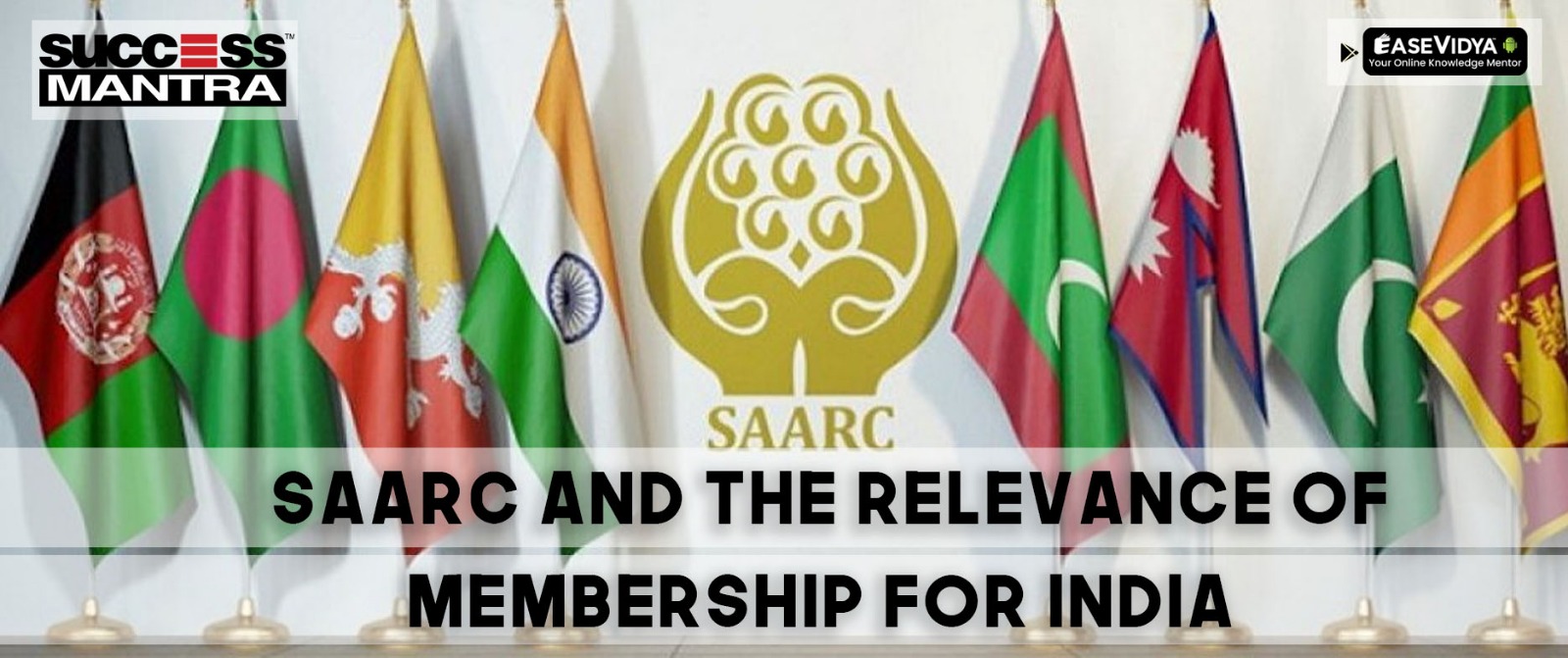
SAARC and the Relevance of Membership for India
SAARC and the Relevance of Membership for India: Strengthening Regional Cooperation
Introduction
The South Asian Association for Regional Cooperation (SAARC) stands as a significant regional organization comprising eight South Asian countries: India, Pakistan, Bangladesh, Sri Lanka, Nepal, Bhutan, Maldives, and Afghanistan. Formed in December 1985, SAARC aims to promote regional cooperation and development among its member countries. In this blog, we will delve into the importance of SAARC's membership for India and its role in fostering regional cooperation and progress.
Historical Context of SAARC
The idea of SAARC can be traced back to the early 1980s when leaders from the South Asian countries recognized the need for regional cooperation to address shared challenges, foster economic growth, and promote cultural exchange. The organization's formation in 1985 marked a significant step towards strengthening ties among the member nations.
Objectives of SAARC
- Economic Cooperation: SAARC strives to enhance economic cooperation among member countries through trade liberalization, market integration, and investment facilitation. It aims to promote intra-regional trade and create a conducive environment for business and economic growth.
- Social and Cultural Collaboration: SAARC endeavors to foster cultural ties, promote people-to-people contact, and preserve the rich heritage and traditions of South Asia. This cultural exchange helps in building mutual understanding and appreciation among member countries.
- Poverty Alleviation and Social Development: SAARC is committed to addressing poverty, inequality, and social issues prevalent in the region. It encourages cooperation in areas such as healthcare, education, and women's empowerment to uplift the quality of life for all citizens.
- Environmental Protection: Recognizing the importance of sustainable development, SAARC emphasizes environmental protection and conservation. Collaborative efforts are undertaken to address environmental challenges and mitigate the impact of climate change in the region.
The Relevance of SAARC Membership for India
- Geopolitical Significance: As the largest and most populous country in South Asia, India plays a pivotal role in the region's geopolitics. SAARC provides a platform for India to engage with its neighboring countries on various regional and global issues. By being a part of SAARC, India can assert its leadership and influence in shaping the region's agenda.
- Economic Integration: India's membership in SAARC facilitates increased economic integration and trade opportunities within the region. Enhanced regional connectivity and trade facilitation agreements enable India to access a larger market for its goods and services, benefiting its economy and promoting regional growth.
- Addressing Security Concerns: South Asia faces several security challenges, including terrorism, cross-border conflicts, and illicit activities. SAARC provides a forum for member countries to discuss and address these security concerns collectively. By working together, India and other member nations can enhance security cooperation and promote peace and stability in the region.
- People-to-People Contact: SAARC fosters cultural and social exchanges among member countries, promoting people-to-people contact and understanding. This connectivity enhances mutual appreciation for the diverse cultures, traditions, and languages of South Asia, contributing to a stronger regional identity.
- Development Initiatives: SAARC's focus on poverty alleviation and social development aligns with India's commitment to inclusive growth and development. India's active participation in SAARC initiatives contributes to the implementation of joint projects and programs aimed at improving the well-being of the region's citizens.
- Disaster Management and Climate Change: South Asia is vulnerable to natural disasters and the adverse effects of climate change. SAARC facilitates cooperation in disaster management and climate resilience efforts. As a member, India collaborates with other nations to strengthen disaster preparedness and response mechanisms.
Challenges and the Way Forward
While SAARC holds immense potential, it has faced challenges in achieving its full potential. Geopolitical tensions and historical conflicts between some member countries have at times hindered the organization's effectiveness. Bilateral disputes have occasionally overshadowed the collective goals of regional cooperation.
To revitalize SAARC's effectiveness, it is crucial for member countries to prioritize the collective interests of the region above individual concerns. Increased engagement, dialogue, and diplomatic efforts are essential to overcome differences and foster trust among member countries.
Conclusion
SAARC remains an essential regional organization that plays a crucial role in fostering cooperation, development, and peace in South Asia. For India, being a member of SAARC is of great significance as it allows the country to engage with its neighboring nations and address common challenges. By promoting economic integration, addressing security concerns, and fostering people-to-people contact, SAARC serves as a vital platform for India to strengthen regional ties and contribute to the overall progress of South Asia. Through collaborative efforts and a commitment to the organization's objectives, SAARC can unlock its full potential and become a powerful force for positive change in the region.













qrdkviqmzo
SAARC and the Relevance of Membership for India <a href="http://www.gx65i528820ph387uzaxuw30160nwpois.org/">aqrdkviqmzo</a> qrdkviqmzo http://www.gx65i528820ph387uzaxuw30160nwpois.org/ [url=http://www.gx65i528820ph387uzaxuw30160nwpois.org/]uqrdkviqmzo[/url]
expgjvhrj
SAARC and the Relevance of Membership for India <a href="http://www.g11f0qujb38cc72316z66m7xcge92fc9s.org/">aexpgjvhrj</a> expgjvhrj http://www.g11f0qujb38cc72316z66m7xcge92fc9s.org/ [url=http://www.g11f0qujb38cc72316z66m7xcge92fc9s.org/]uexpgjvhrj[/url]
tvcrfkocr
SAARC and the Relevance of Membership for India tvcrfkocr http://www.gb132u09p61o5lhnlvd70ly094x62x0ws.org/ <a href="http://www.gb132u09p61o5lhnlvd70ly094x62x0ws.org/">atvcrfkocr</a> [url=http://www.gb132u09p61o5lhnlvd70ly094x62x0ws.org/]utvcrfkocr[/url]
dmpyfjvtcm
SAARC and the Relevance of Membership for India dmpyfjvtcm http://www.gy74k5x2a1t9151zhadz5l65qr2j509ns.org/ [url=http://www.gy74k5x2a1t9151zhadz5l65qr2j509ns.org/]udmpyfjvtcm[/url] <a href="http://www.gy74k5x2a1t9151zhadz5l65qr2j509ns.org/">admpyfjvtcm</a>
lwwmjhykfw
SAARC and the Relevance of Membership for India <a href="http://www.g90isp454z7c34137oo6oc08m3g7wfius.org/">alwwmjhykfw</a> [url=http://www.g90isp454z7c34137oo6oc08m3g7wfius.org/]ulwwmjhykfw[/url] lwwmjhykfw http://www.g90isp454z7c34137oo6oc08m3g7wfius.org/
yyemvjirih
SAARC and the Relevance of Membership for India [url=http://www.g455c01w66bj4x3t3lh2pb7zt4o807mys.org/]uyyemvjirih[/url] yyemvjirih http://www.g455c01w66bj4x3t3lh2pb7zt4o807mys.org/ <a href="http://www.g455c01w66bj4x3t3lh2pb7zt4o807mys.org/">ayyemvjirih</a>
fcyrtzjpo
SAARC and the Relevance of Membership for India [url=http://www.gqft92g25nj75a4kw3ko3n67154m6xh5s.org/]ufcyrtzjpo[/url] <a href="http://www.gqft92g25nj75a4kw3ko3n67154m6xh5s.org/">afcyrtzjpo</a> fcyrtzjpo http://www.gqft92g25nj75a4kw3ko3n67154m6xh5s.org/
mlqcviwlzn
SAARC and the Relevance of Membership for India [url=http://www.gl2601ws002u6hjjj4r3kpm73f45no29s.org/]umlqcviwlzn[/url] mlqcviwlzn http://www.gl2601ws002u6hjjj4r3kpm73f45no29s.org/ <a href="http://www.gl2601ws002u6hjjj4r3kpm73f45no29s.org/">amlqcviwlzn</a>
ionrbobvdo
Latest News on Education & LAW Exams Blogs | Success Mantra <a href="http://www.gnjm294xcy7pr60m39i4gb1c40d8y808s.org/">aionrbobvdo</a> [url=http://www.gnjm294xcy7pr60m39i4gb1c40d8y808s.org/]uionrbobvdo[/url] ionrbobvdo http://www.gnjm294xcy7pr60m39i4gb1c40d8y808s.org/
npdkhhxyeh
Latest News on Education & LAW Exams Blogs | Success Mantra <a href="http://www.g87jw0sgu22cce7029f7vu624iw42bw2s.org/">anpdkhhxyeh</a> npdkhhxyeh http://www.g87jw0sgu22cce7029f7vu624iw42bw2s.org/ [url=http://www.g87jw0sgu22cce7029f7vu624iw42bw2s.org/]unpdkhhxyeh[/url]